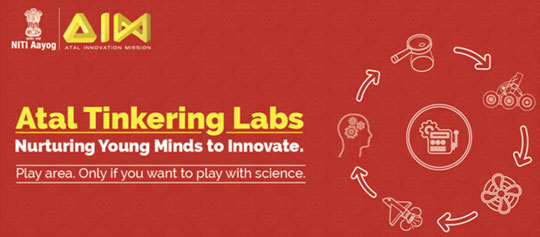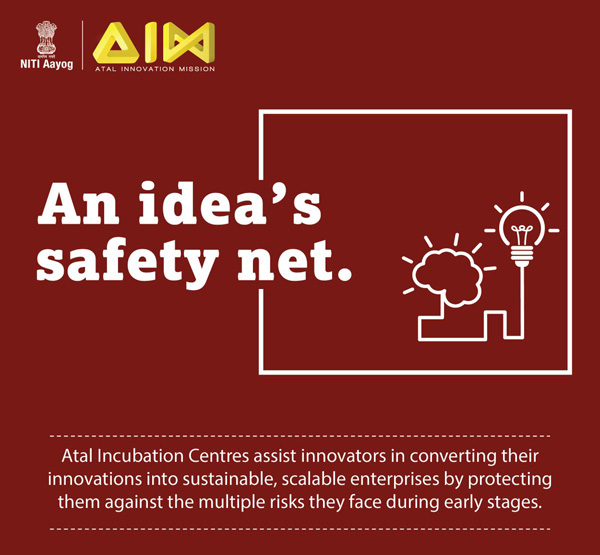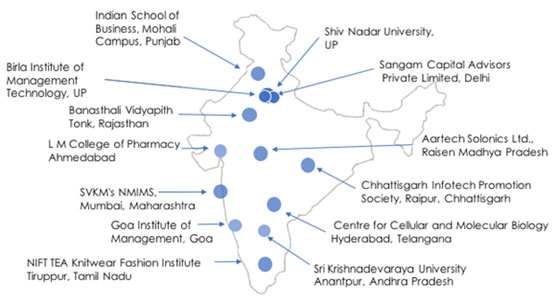
Let’s take a deeper look at each of the programs to understand how they influence the innovation mindset.
Atal Tinkering Labs (ATL) is launched with the objective of fostering curiosity, creativity and imagination in young minds. The ATL program provides funding to schools for setting up, one of its kind tinkering workspace for students of class 6th to class 12th to learn innovation skills and develop ideas. ATLs provides a platform for the young minds to experiment and learn with various tools and equipment – D-I-Y electronics kits, robotics kits, sensors and Internet of Things (IoT), Rapid prototyping tools (3D printers). The children are encouraged to develop innovative solutions to solve problems faced by their communities. AIM provides grant-in-aid of Rs. 20 Lakhs that includes a one-time lab establishment grant money of INR 10 Lakhs and Rs. 2 Lakhs every year for a period of 5 years towards consumables and maintenance.
The ATL program is one of the biggest programs globally that has been launched at school level at this scale with a potential to disrupt the formal education system and create neoteric innovators that shall lead the torch of innovation in India as they grow up. In the first round of applications invited in 2016-17, AIM received more than 13,000 applications from schools in all Sates/ UTs and selected 941 schools from across 34 States/ UTs to establish Atal Tinkering Labs through a competitive process. The next round of evaluation of applications is ongoing and the Atal Innovation Mission hopes to set up at least 2000 ATLs in the country by the end of this year.
In order to ensure the success of this strategic nation building initiative, AIM has launched a massive initiative to build one of the largest volunteer mentor network to foster the spirit of innovation in school children. Under the Mentor India program, the focus is to engage volunteer mentors from industry who can spend at least 2 hours per week in these labs and enable students to think innovatively and help them with tinkering activities.
Apart from funding support, the AIM team facilitates training of teachers, a curriculum guide for the ATL projects, various contests and interventions such as the Tinker Fest and the ATL Tinkering Marathons. Industry partners have been roped in to assist implementation of some of these programs.
AIM intends to support the establishment of green field Incubation Centres called Atal Incubation Centres (AICs). Incubation Centres are organizations that nurture innovative start-up businesses in their pursuit to become scalable and sustainable enterprises.

AIM endeavors to do this by providing support to various academic and non-academic institutions (corporate sectors, alternate investment funds, business accelerators etc.) for establishing Atal Incubation Centres (AICs). The grant-in-aid would be up to Rs. 10 crore for establishing an AIC over a period of 5 years, which can be spent towards capital investment or operational and maintenance expenses. This would include suitable physical infrastructure (sector specific labs and office space) coupled with the availability of sectoral experts for mentoring the start-ups, business planning support, access to seed capital, industry partners, trainings and other relevant components required for encouraging innovative start-ups.
Last year, out of the 3600+ applications received, AIM has selected 13 academic and non-academic organizations to set up AICs with world class incubation facilities. These 13 applicants have been selected from diverse backgrounds and regions.
One of the incubators selected last year focuses on energy and cleantech (Sangam Ventures) while the other one on textiles and garments (NIFT TEA Knitwear Fashion Institute). Another incubator has been set up at an all-women’s university in Rajasthan (Banasthali Vidyapeeth) to promote women entrepreneurship. 36Inc is an example of an Incubator where the State of Chhattisgarh has partnered with AIM to catalyze the innovation ecosystem in that region.
The AIC program focuses on fulfilling gaps and dispersing the incubation facilities in areas that are not yet a part of the ongoing startup revolution in the country. Emphasis is also given to consortiums comprising academic institutions and the industry as the industry can facilitate faster commercialization of technologies than a pure-play academic incubator.

Scaling up support to Established Incubation Centres (EICs)
While the AIC program is meant to fill gaps, the EIC program is launched with the objective of rewarding the successful incubation centres. This program calls for applications from existing incubation centers and evaluates them on the basis of their past performance. The key performance indicators (KPIs) of the past few years of the applicants are scored and the business plan for scaling up is evaluated. Based on the evaluations, the best performing incubator centres are provided with grant-in-aid of upto Rs. 10 crore for scaling up their activities and supporting a larger number of technology based startups. AIM has granted 6 EICs in the last year.
Beyond the grant-in-aid for AICs and EICs, AIM shall focus on creating the necessary ecosystem to enable the AICs to grow and nurture. We shall facilitate research studies, capacity building for incubator managers, advisory support and partnerships with industry. The objective is to ensure that the startups supported by the Incubators can become successful, grow exponentially and make a sizable impact on the economy of the country.
Atal Vikas Challenges
NITI Aayog’s Expert Committee on Innovation and Entrepreneurship had identified in its report the need to incentivize innovation in areas critical to India’s growth and development, such as health, housing, hygiene, energy and water to name a few. The Atal Vikas Challenges (AVCs) program aims to address the problem of innovators where they are unable to access resources for piloting, testing, and market creation. The AVCs shall incentivize the innovators by providing grants oriented towards creating commercial products from existing technologies, to fill needs across various economic and social sectors. The AVCs are going to be launched shortly with an objective of catalyzing innovation led by high-tech focused startups and MSMEs
The AVCs shall invite innovators/MSMEs interested to design market-ready products based on cutting edge technologies in 12 identified priority technology areas. Applicants showing capability, intent, and promise to be able to productize technologies will be awarded grants. Furthermore, the winning grantees will be helped to create go-to-market strategies by leading incubators and accelerators, and other appropriate means.
Atal Grand Challenges
AIM initiates to find desirable solutions to the socio-economic problems of India by launching a series of challenges called as ‘Atal Grand Challenges’(AGC) which will act as a platform to tap the reservoir of knowledge and talent in Indian innovators and corporations to innovate in areas critical to nation building. The underlying purpose of Atal Grand Challenge is national transformation through indigenous innovation by developing novel disruptive technologies that are ultra-low cost, economically affordable and customized to the local conditions. The AGCs shall be launched shortly.
For integrating the innovation ecosystem, AIM has tied up with many leading corporations and academic institutions to drive this innovation movement and build young innovators across the country. AICTE, Amazon, INTEL, IBM, DELL, TGELF, OLA are only some of the names that have partnered with NITI Aayog to further the initiatives and programs of Atal Innovation Mission. Many more corporates are willing and eager to join hands for this nation building noble initiative.
Mr. R Ramanan, the Mission Director of Atal Innovation Mission frequently visits the ATLs and the AICs as well as the EICs to monitor their performances. His visits have revealed significant amount of innovation that the AIM initiatives have been able to channelize in a short period of less than a year. “I have been consistently amazed to see the fascinating innovative ideas and solutions by our young school students in the ATL Labs / Atal Tinkering Challenges as well as by the startup incubatees of the Atal Incubators. I can confidently assert that this has now become an irreversible leap forward into a new era of innovative thinking, innovators and potential job creators by the youth of our county. I truly believe the spark of innovation ignited in our schools, universities, startups and corporate institutions will lead India into a leadership position in the knowledge based economy that is sweeping the world in the current century.” says Mr. Ramanan.

AIM is mindful of the sharp focus that NITI Aayog and the current government of India places on outcome driven approach for schemes and programs. AIM is also developing an online monitoring system to ensure an outcome oriented approach of all its initiatives. The grantees of all the programs of AIM shall be monitored very closely to be able to maximize the impact that they are able to create, do mid-course corrections, and ensure accountability for the public money that is being granted to them. The results of the monitoring system shall feed into the research partnerships that AIM is setting up for publishing knowledge papers and providing inputs to policy makers in the area of innovation and entrepreneurship.
Courtesy: Healthy India Chronicle






